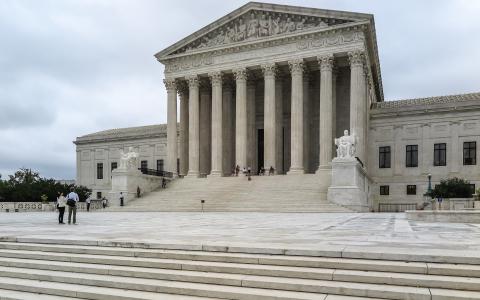
(CNN) - The Supreme Court on Thursday limited the power of the Securities and Exchange Commission to enforce security fraud violations, siding with a hedge fund manager and former conservative radio show host who said he was entitled to a jury trial rather than an in-house review by the agency.
The decision could have enormous consequences for the SEC and other agencies, requiring them to pursue violations in federal court rather than with a more streamlined internal review. That could make it harder to police fraud and protect investors while adding to federal court backlogs.
Chief Justice John Roberts wrote the decision for a 6-3 majority, with the court’s three liberals in dissent.
The Supreme Court declined to address more existential challenges to the agency’s enforcement structure, including claims that could have severely undermined the government’s ability to use in-house administrative law judges or protect them from the political whims of a president.
“A defendant facing a fraud suit has the right to be tried by a jury of his peers before a neutral adjudicator,” Roberts wrote. “Rather than recognize that right,” the chief wrote that his dissenting colleagues would “permit Congress to concentrate the roles of prosecutor, judge, and jury in the hands of the executive branch.”
“That is the very opposite of the separation of powers that the Constitution demands,” he wrote.
Sotomayor reads dissent from the bench
A dissent by Justice Sonia Sotomayor, signed by the court’s two other liberals, called Thursday’s ruling a “power grab” that “upends longstanding precedent and the established practice of its coequal partners in our tripartite system of government.”
She said “momentous consequences that flow from the majority’s insistence that the Government’s rights to civil penalties must now be tried before a jury in federal court.”
“Today’s ruling is part of a disconcerting trend: When it comes to the separation of powers, this court tells the American public and its coordinate branches that it knows best,” Sotomayor wrote, later adding that whether to use a system of in-house agency adjudication was a policy decision that should be made by Congress.
“Make no mistake: Today’s decision is a power grab,” she wrote. “It prescribes artificial constraints on what modern-day adaptable governance must look like.”
But the court’s decision was far more narrow than it could have been. The court of appeals in Louisiana, which also ruled against the SEC, embraced a wider series of arguments that could have hobbled enforcement by several agencies. Instead of dealing with those questions, Roberts focused entirely on the question of whether the Seventh Amendment requires jury trials for the types of actions at issue.
George Jarkesy, the hedge fund manager at the center of the dispute, applauded the court’s ruling, saying the “ramifications of this case are so much bigger than one person.”
“After a decade of gross misconduct and blatantly unconstitutional political attacks from the SEC and their in-house court, today the United States Supreme Court ruled that the Constitution still matters,” he said in a statement.
Federal agency power in the crosshairs
The case, one of several this term challenging the power of federal agencies, arose in 2013 when the SEC brought an enforcement action for securities fraud against Jarkesy, who established two hedge funds that held about $24 million in assets and brought in over 100 investors.
The agency accused Jarkesy of overvaluing assets so he could charge higher fees. An administrative law judge – an in-house agency employee who adjudicates such claims – sustained the allegations and ordered Jarkesy to pay a civil penalty of $300,000 and to repay nearly $685,000 in “ill-gotten gains.”
Jarkesy not only challenged the decision but also the process used to reach it. He claimed the in-house procedure violated the 7th Amendment’s right to a jury trial. He also said the way the agency’s administrative law judges are appointed violates other provisions of the Constitution because the president is barred from removing them in most circumstances.
Such protections were put in place in the 1940s to insulate in-agency law judges from politics and criticism that the proceedings were biased in favor of the agencies they worked for. The SEC’s administrative law judges may only be removed “for cause” by the SEC’s commissioners, who also may only be removed for cause.
The SEC consists of five members appointed by the president and confirmed by the Senate. The commission can enforce a variety of federal statutes in two ways. It can institute administrative enforcement proceedings seeking civil penalties, or it may bring civil actions in federal court.
The 5th US Circuit Court of Appeals backed Jarkesy on three constitutional claims. It held that certain SEC proceedings deprive individuals of their right to a jury. It said Congress improperly delegated legislative power to the SEC, giving the agency authority to choose the in-house administrative route rather than a federal court. And it said that the way administrative law judges were protected from removal violated constitutional principles of presidential power.
Other agencies use similar in-house judges to review fraud claims, including the Department of Labor and the Social Security Administration.
The SEC case is one of several before the Supreme Court this year attempting to undermine the power of federal agencies. A pair of cases argued in mid-January challenged the ability of agencies to interpret vague laws when they set regulations. Another involved the funding mechanism for the Consumer Financial Protection Bureau, an agency created after the 2008 financial crisis.
A 7-2 majority upheld that funding structure on May 16 in an opinion written by Justice Clarence Thomas that represented a significant win for the Biden administration.
By John Fritze and Tierney Sneed
June 27, 2024



